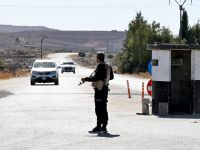Morocco’s King Mohammad VI concluded Wednesday a two-day visit to the disputed Western Sahara, and announced in the regional capital Layoune, the creation of an agency to promote its economic and social development.
The visit, which The Popular Front for the Liberation of the Saguia el-Hamra and Rio de Oro (Polisario Front) denounced as "provocation", came at a time of renewed international attempts to resolve this territorial dispute that has pitted Morocco against Polisario Front for 27 years.
Moroccan officials, news agencies reported, said the trip was designed to assert Morocco's claim on the territory. It is the second by the King since being enthroned in 1999.
Head of Western Sahara Mission for UK & Ireland said in a statement that “the repeated visits of the King of Morocco to the Sahrawi occupied territories will not make Western Sahara a Moroccan territory.”
During his visit, King Mohammed reiterated that Morocco would not relinquish a single inch of the territory of Sahara. He declared "Morocco shall not relinquish an inch of its Sahara territory, which is inalienable and indivisible".
In a speech he delivered Wednesday in Laayoune, where he arrived in the morning after a visit Tuesday to Dakhla, the king emphasized that Sahara was "part and parcel of the national territory and a fundamental component of the historical entity and civilizational identity of Morocco."
Morocco annexed Western Sahara in 1975 when the colonial power Spain, pulled out. But the armed Polisario Front declared that the area, over 260,000 sq. km, was not part of Morocco and in 1975 started fighting for its independence. In 1976, Polisario Front proclaimed unilateral independence and named the region the Sahraoui Arab Democratic Republic.
A cease-fire accord in 1991, ended the fighting allowing the UN to deploy a mission to help maintain peace, and organize a referendum in the region. However, the UN has until now failed to hold the referendum for several reasons, including disagreements on who would be eligible to vote.
The latest UN efforts came from Secretary-General Kofi Annan, who last month, proposed four possible solutions to the dispute - the resumption of the implementation of a settlement plan without the necessary approval of both parties, the revision of the 2001 framework agreement proposed by his personal envoy James Baker, the division of the territory between the two belligerents, and the withdrawal of MINURSO, the UN mission in Western Sahara.
The UN Security Council, which last week extended MINURSO's mandate by two months, is currently studying Anna's ideas. (Albawaba.com)
© 2002 Al Bawaba (www.albawaba.com)







